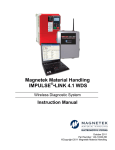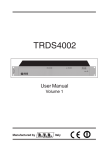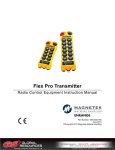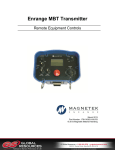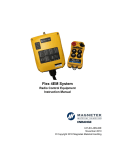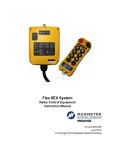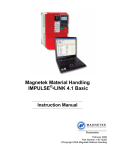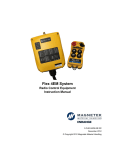Download Magnetek 144-45117-R3 Instruction manual
Transcript
Regenerative Power Module And Common Bus RPM Panels Instruction Manual Part Number 144-45117-R3 September 2010 ©Copyright 2010 Magnetek Material Handling PRODUCT MANUAL SAFETY INFORMATION Magnetek, Inc. (Magnetek) offers a broad range of radio remote control products, control products and adjustable frequency drives, and industrial braking systems for material handling applications. This manual has been prepared by Magnetek to provide information and recommendations for the installation, use, operation and service of Magnetek’s material handling products and systems (Magnetek Products). Anyone who uses, operates, maintains, services, installs or owns Magnetek Products should know, understand and follow the instructions and safety recommendations in this manual for Magnetek Products. The recommendations in this manual do not take precedence over any of the following requirements relating to cranes, hoists lifting devices or other material handling equipment which use or include Magnetek Products: • • • • • Instructions, manuals, and safety warnings of the manufacturers of the equipment where the radio system is used, Plant safety rules and procedures of the employers and the owners of facilities where the Magnetek Products are being used, Regulations issued by the Occupational Health and Safety Administration (OSHA), Applicable local, state or federal codes, ordinances, standards and requirements, or Safety standards and practices for the industries in which Magnetek Products are used. This manual does not include or address the specific instructions and safety warnings of these manufacturers or any of the other requirements listed above. It is the responsibility of the owners, users and operators of the Magnetek Products to know, understand and follow all of these requirements. It is the responsibility of the employer to make its employees aware of all of the above listed requirements and to make certain that all operators are properly trained. No one should use Magnetek Products prior to becoming familiar with and being trained in these requirements and the instructions and safety recommendations in this manual. WARRANTY INFORMATION FOR INFORMATION ON MAGNETEK’S PRODUCT WARRANTIES BY PRODUCT TYPE, PLEASE VISIT WWW.MAGNETEKMH.COM. Regenerative Power Module - September 2010 144-45117-R3 Page 3 of 20 Disclaimer of Warranty Magnetek, hereafter referred to as Company, assumes no responsibility for improper programming of a drive by untrained personnel. A drive should only be programmed by a trained technician who has read and understands the contents of this manual. Improper programming of a drive can lead to unexpected, undesirable, or unsafe operation or performance of the drive. This may result in damage to equipment or personal injury. Company shall not be liable for economic loss, property damage, or other consequential damages or physical injury sustained by the purchaser or by any third party as a result of such programming. Company neither assumes nor authorizes any other person to assume for Company any other liability in connection with the sale or use of this product. WARNING Improper settings of this product can lead to unexpected, undesirable, or unsafe operation or performance of the controls. Regenerative Power Module - September 2010 144-45117-R3 Page 4 of 20 General Description The Regenerative Power Module (RPM) is a universal brake chopper circuit designed to dissipate regenerative energy produced by a motor into a fixed resistor load. The universal module covers the DC supply voltage range from 200V to 660V. The voltage selector link located on the outside front cover of the unit configures the module for LOW voltage (200V to 300V), MED voltage (300V to 500V) or HIGH voltage (500V to 660V). The module is powered from the DC bus and requires no additional power supplies. The module can either be connected behind the M contactor of each drive or can be connected to the incoming DC bus using a separate mounted controller that includes additional protective components and line capacitance. This module is required whenever the main power supply cannot receive the regenerated power being return to the line. The voltage on the OmniPulse DDC bus rises rapidly during regeneration (100 ms). Bus feed rectifier units that do not have a dump circuit or have slow reacting circuits require the use of the RPM module and dump resistor. RPM Features Ratings Input Voltage Range Brake Level Adjustment Range Rated Amps Peak Brake Current Duty Cycle (800A peak) Minimum connected dump resistor Maximum Operating Temperature Minimum Operating Temperature Minimum 200VDC Maximum 660 VDC Minimum 256 VDC Maximum 800 VDC 400A 800A 10% (40° C ambient) 5% (60° C ambient) 1 ohm 60° C -20° C Universal Module (Voltage selector link, located on the front of the unit, configures module to DC Bus voltage) Link Setting 330 V (Low) 495 V (Medium) 660 V (High) DC Bus Range 200 – 300 VDC 300 – 500 VDC 500 – 660 VDC Regenerative Power Module - September 2010 144-45117-R3 Page 5 of 20 Voltage Display A 10-LED Switch Level bar graph provides a visual display of the approximate bus voltage level when the brake transistor turns on. Simplified Switching Level Selection An 8-position DIP switch provides transistor turn on switching level selection in 15 steps. Link Setting 330 495 660 Adj Range 256 – 400 VDC 384 - 600 512 - 800 Volt/Step 16 24 32 Choose the appropriate setting for the voltage link set up and set the appropriate corresponding DIP switch position on. All other DIP settings must be off. • Mode Switches A 4-position DIP switch provides the following configuration selections: DIP Position 1 2 3 4 Off Setting Enable Ext Intlk Auto Reset 2-Term Res Not Used On Setting Disable Ext Intlk Remote Reset 3-Term Res Not Used The External Interlock may be used for the connection of a normally closed temperature switch mounted at the power resistor. • Overheat Protection The thermistor mounted on the heat sink is used to protect against failure caused by excessive duty combined with excessive ambient temperatures. The unit is shut down when the heat sink temperature exceeds 95° C. • 24V Output for Fan A +24V Fan output is available for supplemental cooling. The Fan output is capable of delivering up to 5W for the addition of an external fan separately mounted from the RPM unit. The output becomes active when the heat sink temperature exceeds 65° C. Regenerative Power Module - September 2010 144-45117-R3 Page 6 of 20 • LED Fault and Status Indicators LED status indicators provide the following indications: COLOR MARKING GREEN POWER • GREEN INTERLOCK GREEN READY AMBER AMBER RED ACTIVE RESET OVERTEMP RED IGBT FAULT DESCRIPTION Indicates that the brake chopper power supply is present Indicates that the external contact is closed when the interlock is enabled or that the interlock is in the disabled position Indicates that no fault condition exists and that the external interlock is not open Indicates that the brake chopper is conducting Indicates that the reset circuit is activated Indicates that the heat sink temperature has reached 95° C and the module has shut down to protect the transistor. Indicates that the module is shut down on short circuit IGBT detection TEST Switch The TEST switch simulates a DC bus voltage increase; this input is used to set the turn on voltage and verify transistor and resistor functionality. Regenerative Power Module - September 2010 144-45117-R3 Page 7 of 20 External Control Terminals A pluggable Phoenix screw terminal connector is provided to facilitate additional functionality: Pin 1 Signal Name External +24V Supply 2 Fault 3 Sync 4 Reset 5 Fan 6 7 Ready Level 8 I-Lock 9 10 0V 0V Function Allows control circuit of the brake module to be powered from an external supply. (Eliminates 25ms delay for control power to become established from main DC bus power.) 24 volts between this terminal and terminal 9 or 10 indicates that the brake module is in a fault condition. This can be used for remote fault annunciation. Connect to same terminal of other brake modules to synchronize switching in order to balance brake load between two or more modules. The 0V pins of synchronized modules must also be connected together. Apply positive pulse between 10V and 24V to remotely reset a brake module fault. The 24-volt DC Fan output is capable of delivering up to 5W of power for the addition of an external fan separately mounted from the RPM unit. The output becomes active when the heat sink temperature exceeds 65° C. Connect between terminals 5 and 10. 24 Volt output, RPM ready Brake level switching allows the switching voltage turn on level to be reduced by as much as 100 volts. The voltage input to terminal 7 can be fixed or variable and needs to be connected to the 0V circuit common. See FIGURE 1 for a graphic representation of the dynamic adjustment capability. Connection point for resistor overheat protection switch. Normally-closed switch: Connect between either terminals 8 and 9 or 8 and 10. Input has a 50 ms filter to reduce noise. Control circuit common. Control circuit common Regenerative Power Module - September 2010 144-45117-R3 Page 8 of 20 Switching level Normal switching level 100V 0V Terminal 7 Voltage 10V FIGURE 1 RPM UNIT Turn On Dynamic Adjustment FIGURE 2 Syncrhonization Connection Regenerative Power Module - September 2010 144-45117-R3 Page 9 of 20 Power Terminal Connections TERM L1+ L2R1+ R2R3+ Function DC Bus Positive DC Bus Negative Resistor Positive (Same potential as DC Bus Positive) Resistor Negative (Switched Output) Terminal must be connected to the external resistor whenever the separate mounted RPM panel with the required additional protective components is connected directly to the DC bus. See FIGURE 4 for example connections. External Power Connection An external 24V supply may be connected to the brake chopper at pins 1 and 10. The internal 24 and 15 volt power supplies of the brake chopper is derived from the main DC bus input and takes approximately 50ms to start up. If it is necessary for the brake chopper to be active within less than 50ms of applying the DC bus voltage an external power supply should be provided. The external 24-volt DC supply is not needed on crane applications using the OmniPulse DDC. Synchronization Synchronization equalizes the power dissipation in the braking resistors. When two or more brake chopper modules are connected to the same DC bus they should be synchronized by linking together all of the SYNC signals on all modules and linking together a 0V common from each module. See FIGURE 2 for connection. When the DC bus voltage exceeds the voltage threshold of any of the brake choppers the SYNC signal will turn all of them on. The DC bus voltage must fall below the voltage threshold of all choppers in order for the synchronized modules to turn off. Regenerative Power Module - September 2010 144-45117-R3 Page 10 of 20 Resistor Sizing The minimum connected resistor to the standard RPM module is 1 ohm. The resistor value can be greater than this but never lower. Use the following procedure to calculate the continuous current rating of the resistor chosen. 1. Tabulate all motion Full Load Amps (FLA) • • 2. ½ hour FLA for hoist motion 1 hour FLA for travel motions Calculate Regen Current for simultaneous motion operation ⎛ ⎞ ⎛ ⎞ IREGEN= ⎜∑FLA * 0.8⎟ + ⎜∑FLA * 0.3⎟ HOIST TRAVEL ⎝ ⎠ ⎝ ⎠ 3. Size RPM Unit(s) and external resistors as close as possible to calculated value. Regenerative Power Module - September 2010 144-45117-R3 Page 11 of 20 L1(+) R1 L1 (+) for RPM is connected between M contactor and the DDC drive L1(+) RPM resistor R2 144-45087 RPM * R3 FAULT SYNCH RESET FAN READY BRAKE LEVEL INTERLOCK 0 VDC 0VDC L2(-) + 24 VDC L2(-) 1 2 3 4 5 6 7 8 9 10 * EXTERNAL RESISTOR GRIDS WITH NORMALLYCLOSED OVER TEMPERATURE SWITCH IN THIS CONFIGURATION SET DIP SWITCH - 3 “TERMINAL RESISTOR” TO OFF POSITION ON RPM UNIT FIGURE 3 400 AMP Single RPM Unit The connection shown in FIGURE 3 is a single 400 AMP RPM Unit that is connected to the DDC bus after the M contactor. This is the simplest connection possible and requires no additional protective components. Regenerative Power Module - September 2010 144-45117-R3 Page 12 of 20 FIGURE 4 400 AMP 230-320V Common Bus RPM Panel The connection in FIGURE 4 shows a separately mounted 400 AMP RPM Panel that is connected across the 230-320V. The panel is generally connected on the load side of the Manual Magnetic Disconnect Switch. Connections direct to the DC Bus require additional protective components that are included on the separately mounted RPM panel. WARNING Warning: Connecting the RPM Module directly to the DC Bus without the additional components shown above can result in damage to the RPM unit and other equipment on the common bus. Regenerative Power Module - September 2010 144-45117-R3 Page 13 of 20 FIGURE 5 400 AMP 360-720V Separate Mounted The connection in FIGURE 5 shows a separately mounted 400 AMP RPM Panel that is connected across the 360-720V. The panel is generally connected on the load side of the Manual Magnetic Disconnect Switch. Connections direct to the DC Bus require additional protective components that are included on the separately mounted RPM panel. Regenerative Power Module - September 2010 144-45117-R3 Page 14 of 20 FIGURE 6 800 AMP 230-320V Separate Mounted RPM Panel The connection in FIGURE 6 shows an 800 AMP RPM Panel that is connected across the 230-320V. The panel is generally connected on the load side of the Manual Magnetic Disconnect Switch. The Synchronization line is connected between both RPMs in order to have proper load sharing. Regenerative Power Module - September 2010 144-45117-R3 Page 15 of 20 FIGURE 7 800 AMP 360-720V Separate Mounted RPM Panel The connection in FIGURE 7 shows an 800 AMP RPM Panel that is connected across the 360-720V. The panel is generally connected on the load side of the Manual Magnetic Disconnect Switch. The Synchronization line is connected between both RPMs in order to have proper load sharing. Regenerative Power Module - September 2010 144-45117-R3 Page 16 of 20 FIGURE 8 1200 AMP 230-360V Common Bus RPM Panel The connection in FIGURE 8 shows a 1200 AMP RPM Panel that is connected across the 230-360V. The panel is generally connected on the load side of the Manual Magnetic Disconnect Switch. The Synchronization line is connected between both RPMs in order to have proper load sharing. Regenerative Power Module - September 2010 144-45117-R3 Page 17 of 20 FIGURE 9 1200 AMP 360-720V Common Bus RPM Panel The connection in FIGURE 9 shows a 1200 AMP RPM Panel that is connected across the 360-720V. The panel is generally connected on the load side of the Manual Magnetic Disconnect Switch. The Synchronization line is connected between both RPMs in order to have proper load sharing. Regenerative Power Module - September 2010 144-45117-R3 Page 18 of 20 Troubleshooting Taking the following measurements can check the transistor and diode. Q1 POSITIVE PROBE NEGATIVE PROBE READING DP R2 L1 0.312 DN L2 R2 0.312 QP L1 R2 > 0.6 QN R2 L2 > 0.6 TRANSISTOR AND DIODE CHECK USING D.M.M. SET ON DIODE SCALE FIGURE 10 If the Green POWER indicator light on the front cover is out make the following checks. 1. Check for the supply voltage between L1+ and L22. If the supply voltage is present replace the entire RPM unit. Regenerative Power Module - September 2010 144-45117-R3 Page 19 of 20 FIGURE 11 Dimensions 400 AMP RPM Unit Enclosure Dimensions The following table describes the dimensions for the common bus RPM panels. The NEMA 4 enclosures have screw latches to secure the hinged door. Part Number Description 144-45111 144-45112 144-45113 144-45114 144-45115 144-45116 400 Amp/230~320 VDC RPM Panel 800 Amp/230-320 VDC RPM Panel 1200 Amp/230~320 VDC RPM Panel 400 Amp/360~720 VDC RPM Panel 800 Amp/360~720 VDC RPM Panel 1200 Amp/360~720 VDC RPM Panel Dimensions (in) Height Width Length 30 24 16 48 36 16 48 36 16 30 24 16 48 36 16 48 36 16 FIGURE 12 Enclosure Dimensions for the Common Bus RPM Panels Regenerative Power Module - September 2010 144-45117-R3 Page 20 of 20





















